White label definition is quite simple: it is a product or service created by one company (manufacturer, vendor) for sale to another company. This another company (the owner of the white label brand) positions the adopted solution on the market as its own. Thus, the white label meaning is a ready-made product developed by one company and rebranded by another to make it appear its own. The mechanism seems clear, but what does white label mean in business today?
White labeling meaning in business has a somewhat more practical sense than the one we described above. This goes for businesses of any size: the supply of white products on the market is growing, and developers provide increasingly niche solutions. This includes both products for a couple of hundred dollars a month and products that cost thousands of dollars a month. White label meaning in business is a ready-made, highly competitive up-to-market solution on a regular rental model with full technical support and expert guidance. As you can imagine, the launch of the product will require a lot of effort and time, even if you've progressed far past the planning stage. It will take even more time to build your brand recognition and grow a loyal customer base. That's why the white label business model appeared on the market: instead of spending years developing the competitive product, it takes only a few weeks to adapt the technology and rebrand it.
Well, we quickly figured out what does white labeling mean? But obviously, it's not that simple. There are a lot of nuances that we will reveal in this article.
Before we start, here are two sentences to introduce. The SmartyAds team gained many years of successful experience in developing and maintaining advertising platforms that we offer for ownership under the white labeling business model. If this is what you are looking for, don't hesitate to contact us!
What is White Label Branding?
White labeling is producing the products and services and their further rebranding and advertising under another brand’s name. The aim of it is to increase customer loyalty and trust, saving resources and time necessary for new solution development and deployment.
Still, what is white labeling in terms of business growth? Such a model means a lot for startups and businesses that haven’t grown their own competitive brand names yet but already produce the same, or in some cases, even better, quality products or services.
For other companies, such an approach helps to focus solely on development instead of investing resources in marketing and promotion. “White label business” refers to a fully supported product or service that is made by one company but sold by another.
White label product definition implies that it is a “raw” generic commodity, which is consequently rebranded, customized with the company’s logo, label, and identity, and used as their own.
White Label solution requires a minimum of upfront capital investment since the vendor handles all issues with software licensing, data center space or servers, costs on logistics, and tech support. After the company customizes the product with the feel and look of its own brand, it can begin selling the product as its own collecting revenues, and sharing the commission with the service provider or technology.
How does it work?
The vendor company develops a “plug-and-play” product for your business, for instance, a white-label advertising platform that’s seamlessly tailored to suit your brand. Then, you have to “decorate” the product to match your corporate identity. With the help of White Label, you can add your company’s name, logo, icons, URLs, corporate emails, components of the text, and some elements of the website to align them with your brand comfortably. After full customization, you will be ready to turn your white label sales right away, on your own conditions.
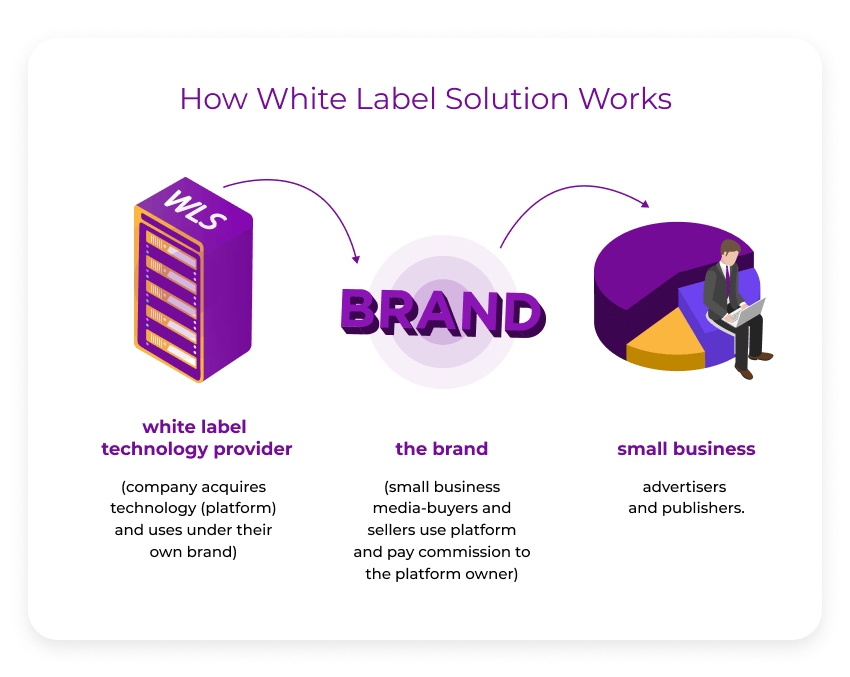
8 Reasons Your Business Needs A White Label Solution
Very few companies can afford their own solution development from scratch. Using ready-made software allows partners to launch their own brand based on existing white label technology, taking into account all the high standards and novelties of the industry.
All technical issues associated with white-label platform development, as well as further support and maintenance, are entirely outsourced to the white-label company. As a result, the brand receives the product which is made following technical requirements set before implementation.
In practice, the white-label approach works well for businesses across different verticals and industries. Saving money, time, and technical platform management are not the only reasons why you might want to launch your own platform. White Label solution is often developed for several less obvious reasons that we will describe in the following sections.
Maintain marketing focus
The business intends to focus primarily on brand-building or developing innovative customer service strategies.
Some modern products, especially in the software industry, hide complex technology under the hood that requires a team of 20-30 top-notch technical staff just to maintain and regularly update it in line with market changes. This is at a time when customization and improvement can be done with a three times smaller technical team that will only spend part of their working time on the product.
This is a big advantage of a white-label brand: the technical part remains in the hands of the manufacturer, while the owner's team focuses on marketing and promotion.
Avoid unnecessary licensing
Some types of production require special registration or licensing. Both in the field of physical products and software.
It's about a basic labor division: one company is more profitable in producing goods, while another in selling them. It's unlikely that anyone would like to get a license for manufacturing drugs or building materials in the USA if they can avoid it by simply selling the finished product. And anyway, the manufacturers of goods are primarily able to produce much more of them than they may sell. Therefore, large manufacturers are often happy to offer their products under the white-label business model.
Customize instead of develop
The company intends to deploy a unique solution that is better adjusted to the brand’s purposes, objectives, customer service process, etc.
In fact, brand customization is a big deal! Customizing a solution based on a unique business need that your company is experiencing and researching is what white labeling meaning truly is. Let's take an example from our own experience. Owners of white-label advertising platforms by SmartyAds are constantly working on customizing the platforms they own. So far, our earliest partners have completely different platforms, each of them perfect for their specific needs. We perform customization of any complexity, and this solution remains the property of the platforms’ owners.
Gain unique advantages
The brand wants to see particular technical features that cannot be found on any other platforms.
A white-label brand can be exceptional from the very beginning. All the innovative features implemented by the manufacturer work together, creating competitive advantages from the get-go. And this is the case when competitors simply have nothing to offer in return.
Reinvest funds
The brand wants to launch its own white-label business to save a share of media-buying costs typically spent on commissions paid to technology providers.
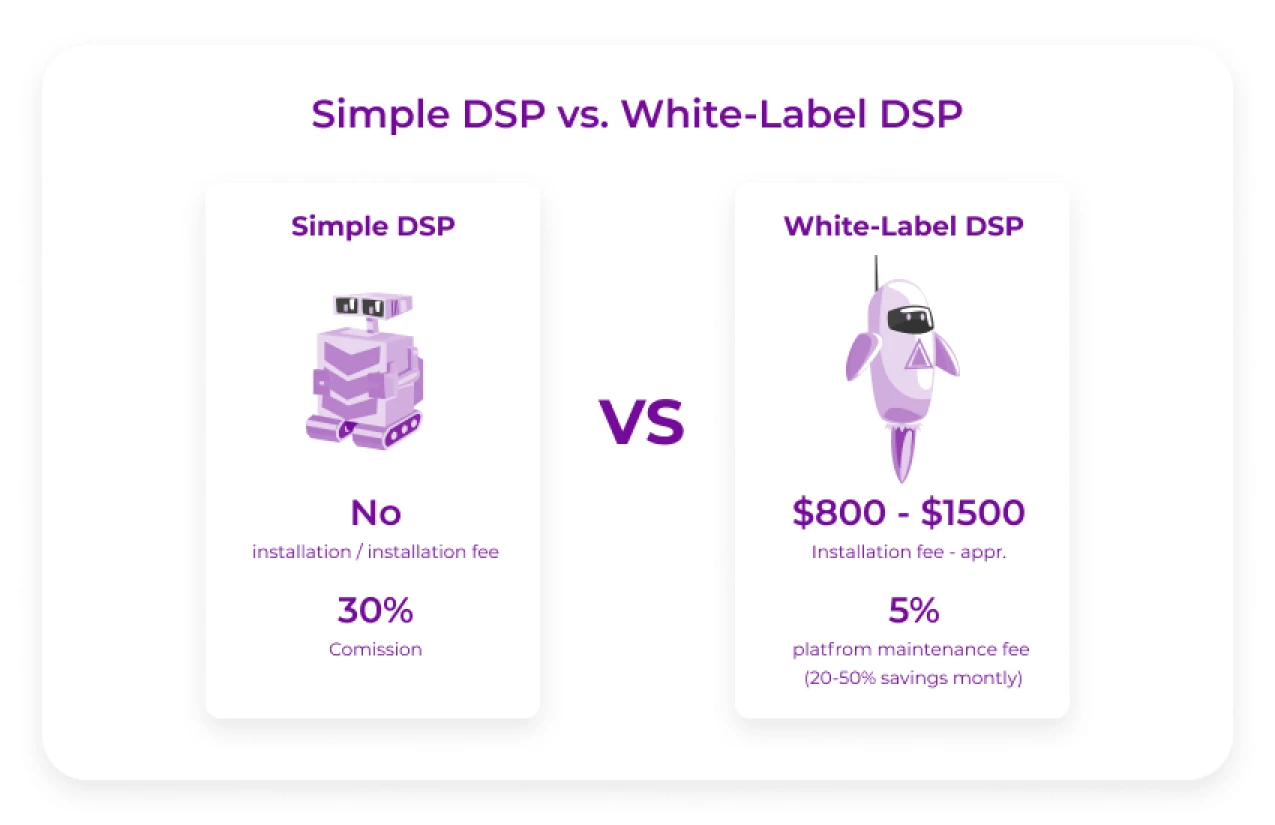
As you can see in the image, we have given an example of a white-label demand-side advertising platform. With large ad budgets, owning the platform in-house is much more profitable than using a third-party solution. In this regard, the white label business model may simply be more economically justified.
Expand to cover new markets
The brand wants to enter a new market and win the competition in the new segment and has a vision of how to capture its aim by applying a unique piece of technology.
We can't reveal any names, but we're ready to give you a real-life example from our experience in general terms. One US-based broadcaster at some point wanted its own white-label platforms for ad integration. After five years of using third-party solutions, we helped the company to switch to their technology based on the white labeling business model. This decision required bravery and experience, and it was executed incredibly well. The payback period was less than one year. You can find more detailed success stories on the website.
Enter the game fast
The company is very small or has only head staff on a team. Still, it has the necessary funds to start a business ASAP.
White label meaning in business matters a lot: a team of talented marketers can become a provider of high-tech solutions in any field. Minimal technical knowledge will be enough to start, this approach has led to the success of many hundreds of companies.
Make your experience an advantage
The company doesn’t want to put quality at risk when developing the new platform and simply acquires technology that their team tried and liked before. And it's completely fine! Investing in partnerships is just as worthy as investing in manufacturing. The white label business model allows you to close complex start-up issues, freeing up time for the further stages.
Why do brands use White Label solutions?
The white labeling definition is quite self-descriptive; think of it metaphorically: the white label company gives you a blank piece of paper where you can write whatever you want and start your own brand immediately. Instead of reinventing the wheel, going through trial and error, and wasting precious time and money, brands choose a simpler option: the White Label Solution. Below, you can discover the main benefits of launching WL products.
It’s all under your brand’s control
The first and most solid advantage is that you have your own freshly baked brand that you can build on ready-made software. Unlike a renowned franchise scheme when you use someone else’s name, White Label allows you to create a unique product, launch your own capitalization service model, and start winning the digital advertising world with it as a business owner. There’s more to it, by rebranding a white-label product as your own, you are reinforcing your trademark alongside with reputation.
It’s quick and easy to deploy
White-label solutions are ready-made, fully tailored solutions that make branding very simple. Through a partnership with a vendor, advertisers get to the market faster and provide customers with a solution immediately. Furthermore, such a solution is exceptional from the point of customization. In case it comes to your mind that this or that function might come in handy in the programmatic platform, white-label solution developers will always help to make that idea of yours come true.
It’s cost and time-efficient
If you decide to build your own product from scratch, it may cost you time training existing employees or recruiting new in-house talents. Apart from the designing, prototyping, and development stages, crucial time should be spent on bug and A/B testing, positioning, and marketing promotion. By using an already-polished product from the white-label service provider, you get a chance to save up budgets on research & development.
It lets you do what you do best
Forced to do something that’s outside their competencies, the brands often achieve poor and unsustainable results. Enthusiasm is a good thing, but in software development experience really matters more. White Label Solution is not a raw script that needs to be retouched or finalized with no guarantee that it will work in the end. A white-labeled platform is a ready-to-use platform that can generate income right away. It undergoes revisions and tests and if something goes wrong, your vendor takes full responsibility for fixing it.
Your customers will be grateful
With a White Label Solution, advertisers can attract loyal customers and build stronger relations with consumers. Here’s why. You need to understand that your customers have needs, and they're searching for easy and straightforward ways to satisfy them. If they find these ways elsewhere, they won’t wait until you develop your own. The White Label Solution lets you dodge the 'lost customers pit' by choosing prepackaged, immediate implementation options.
White Label Implementation Strategies
Before starting the journey into the white label business, we strongly encourage everyone to study the strategies in this section to make informed decisions. After all, business should be based on numbers, not emotions.
Product selection criteria
If you do choose a white label brand, it should satisfy all stages of the company's development. Consider different scenarios and identify as many business needs as possible. Start with the company's current needs and gradually move to the potential ones. Your choice is a product that will cover the maximum demand from the start, and potentially handle all of them.
Partnership building essentials
White label means not only the product but also the team behind the manufacturing of this product. Before starting the integration, make an exhaustive effort to determine how comfortable you will work with the manufacturer's team in the coming years. Be sure to think about a partnership that will last as long as your unique offer exists on the market. Choose only when you have clear confidence: I will definitely succeed with these partners. And if you immediately thought of the SmartyAds team, drop us a line!
Quality control and brand integrity
It is impossible to succeed without technical experts on your side. There must be people who have at least a minimal technical background to understand the specifics of the chosen product. Of course, in the work process, your qualifications will grow, and good partners will take care of this. At the same time, the best result will be achieved when the team of the white label brand owner hires a pool of technical experts whose main job will be improving the product based on the company's exclusive business insights.
What is white-label software in programmatic?
For advertisers
SmartyAds offers a White Label DSP as an opportunity for marketers to have their own, customized demand-side platform with unique features, sophisticated infrastructure, and smart tools to manage ad purchasing programmatically. The platform features smart bidding optimization, fill rate booster, CTR pacer, and support for all creative formats, including Connected TV.
For publishers
White-label online business solutions are designed for publishers, who want to obtain more control over their inventory and gain more yield during media-selling. For them, SmartyAds prepared a White Label SSP platform with a core programmatic ad requests generation mechanism and private deals functionality.
For premium partners. In case you are looking for an open marketplace where advertisers and publishers trade directly, without intermediaries, this is white label SmartyAds Ad Exchange you need to acquire. This independent solution lets you select programmatic partners and adjust media buying or selling according to specific needs.
For independent traders. You can create your own trading place based on white-label technology and invite to the ecosystem only advertisers or publishers of your choice. This way you ensure purity and relevance of traffic, quality of filtered bid requests and responses, and reduce costs for server maintenance.
SmartyAds white label solutions bring advertisers and publishers closer to their brand’s identity and yield optimization because they feature unique advantages.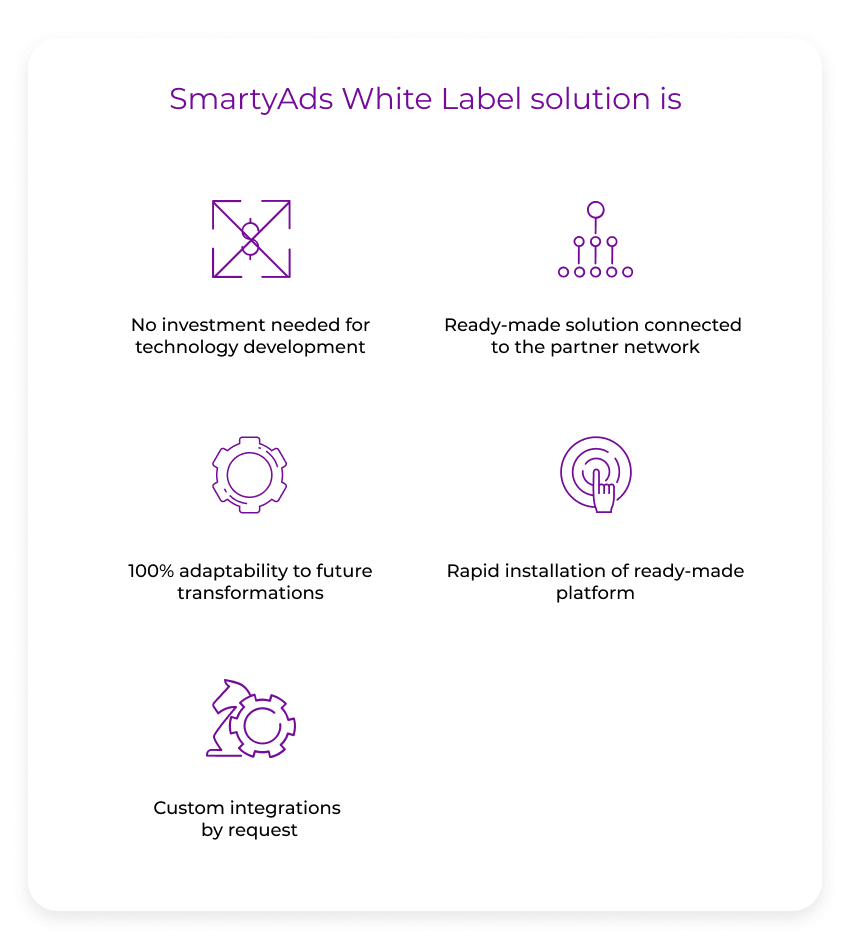
The programmatic white-label solution from SmartyAds is never a “software in the bubble,” it is a fully functional scalable white-label marketing platform that features necessary media-trading infrastructure. In other words, your platform is already connected to the thousands of world-leading demand and supply partners. All that's left to do for us is customizing and launching part, all that's left to do for you is benefitting and celebrating the birth of your own brand!
Want to find out what is a robust white-label product in action?
Contact us, and we’ll help you define the best path for your brand development!
FAQ
White label meaning in business reveals a ready-made product that requires minimal customization before entering the market. A white label model is comparable to the private label model but allows entering the market much faster. Each specific white label brand has competitive advantages for independent market existence, and it could be unlimitedly scaled and customized over time.
The white labeling business model is no different from any other product in terms of branding, there are no restrictions. The marketing component is entirely the responsibility of the brand owner. The only difference is that technical issues should be redirected to the original product development team. But white label brand customers don't need to know about that 😉
- Will the product you choose meet the current and future needs of your business?
- How comfortable do you feel working with the product development team?
- Are you ready to invest in the technical part of the product to improve it: setting up a budget, hiring experts, and devoting time to it? your business's current and future needs
Vendor partnerships become more niche today, while the offered products get more and more opportunities for improving the user experience: personalization, customization, and unlimited scaling with increasing load. We should also note the expansion of artificial intelligence and machine learning in technology products, which allow achieving high results in optimizing performance and reducing the workload of the technical department.
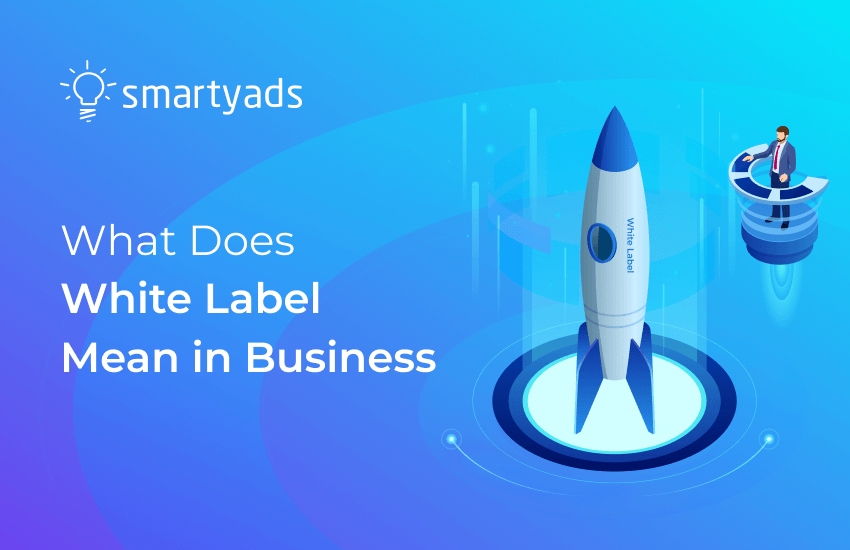
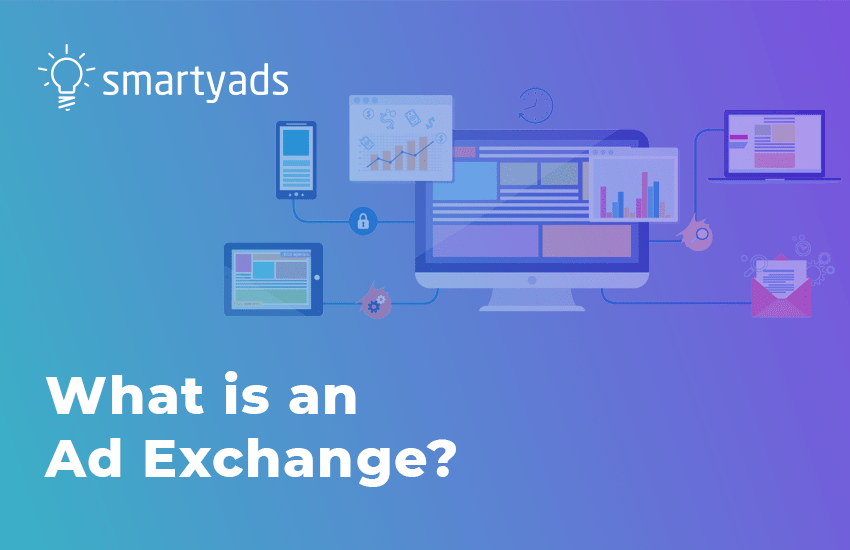


![In-App Advertising: the Complete Guide [Updated 2024]](/storage/uploads/2020/september/in-app-advertising-trends.png)